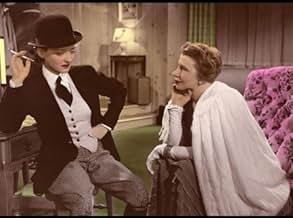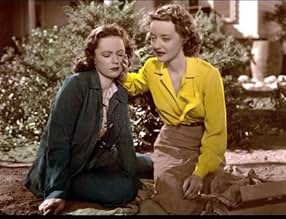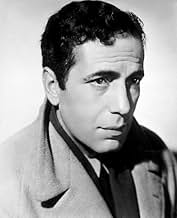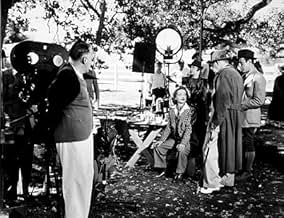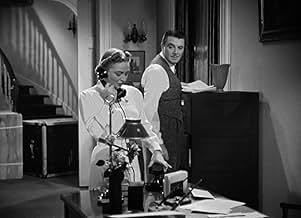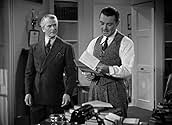CALIFICACIÓN DE IMDb
7.4/10
13 k
TU CALIFICACIÓN
A una joven de la alta sociedad se le diagnostica un tumor cerebral inoperable, y debe decidir si afrontará o no sus últimos días con dignidad.A una joven de la alta sociedad se le diagnostica un tumor cerebral inoperable, y debe decidir si afrontará o no sus últimos días con dignidad.A una joven de la alta sociedad se le diagnostica un tumor cerebral inoperable, y debe decidir si afrontará o no sus últimos días con dignidad.
- Dirección
- Guionistas
- Elenco
- Nominado a 3 premios Óscar
- 5 premios ganados y 4 nominaciones en total
Black Ace
- Judith's Horse
- (sin créditos)
Marian Alden
- Judith's Friend
- (sin créditos)
Wilda Bennett
- Judith's Friend
- (sin créditos)
Diane Bernard
- Lucy - a Servant
- (sin créditos)
- Dirección
- Guionistas
- Todo el elenco y el equipo
- Producción, taquilla y más en IMDbPro
Opiniones destacadas
By today's standards, "Dark Victory" might seem cliched. Of course, that could be because it was so greatly copied! Here is Bette Davis, a star in the fullness of her talent and ability. Bette simply shines; she owns this film from first frame to last. Ably supported by a wonderful cast (including a somewhat mis-matched Humphrey Bogart as an Irish-brogued horse trainer), it is still difficult to watch the film and not be constantly anticipating Bette's appearance in any scene she isn't in. The ending, even in those days, might have turned out either wimpy or waspish. In Bette's hands, it is neither. It works in a way that literally drains one of emotions. I might also add that, while revealing only a bare back, Bette shows more sensuality than a dozen of today's more "open" actresses.
There is an old disparaging adage about "showing the full gamut from a to b," in this movie Bette not only shows A to Z, but some letters that haven't been invented yet.
Despite my gushing over Ms. Davis, the film is solid in all departments. If you wish to experience when melodrama is great movie-making, see this film.
There is an old disparaging adage about "showing the full gamut from a to b," in this movie Bette not only shows A to Z, but some letters that haven't been invented yet.
Despite my gushing over Ms. Davis, the film is solid in all departments. If you wish to experience when melodrama is great movie-making, see this film.
This is definitely a tear-jerker involving a young socialite Judith Traherne, (Betty Davis) who is full of life and an only child who gets her own way all the time, but is well liked by everyone. Judith loves horses and enjoys riding them and performing with them in various horse shows. The trainer of these horses is Michael O'Leary, (Humphrey Bogart) who loves his work and likes Judith because of her love for animals. One day Judith is riding her horse and her vision becomes blurred and she sees double and falls off the horse. It seems Judy is having bad headaches but does not mention it to anyone and her own doctor refers her to a Dr. Frederick Steele, (George Brent) who is a brain surgeon. Ronald Reagan appears in this film as a playboy drunk who is always drinking. Great performance by all the actors, but bring the tissue box, you will need it.
It's easy to see why Bette Davis admired "Dark Victory" more so than any of her other star-vehicles--her Judith Traherne is the quintessential Bette Davis character: smart, sassy, nervously gay, a drinking pal to the guys and a best buddy to the girls. Traherne is without malice, a real chum, and Davis plays her with fluttery vitriol and upper-crust glee. Long Island society girl, ailing but still strong, falls wildly in love with her doctor...but how can he tell her that she has very little time left to live? The supporting cast is made up of some odd personalities: Geraldine Fitzgerald's dedicated girlfriend seems to have no life outside of Judith's world (and performs her gal-pal duties with a curious severity); Humphrey Bogart is an Irish stable-hand with a secret crush on Judith (she's tempted, but ultimately conveys to him the old 'don't touch' message); Ronald Reagan is a country club type, always in a tuxedo and at the bar; George Brent is the brilliant surgeon who loves Judith (but he's faster with his fists than he is with words). Based on a play by George Emerson Brewer, Jr. and Bertram Bloch (which had starred Tallulah Bankhead), this chatty Warner Bros. weeper is glossy and flossy, a dithering, overstated, swooning romantic mini-epic for masochists. In other words, the archetypal Bette Davis film. *** from ****
You've been feeling somewhat ill, and just not with it, your vision gets quite blurred, but you admit it, so it's off to see the doc, though you're in for quite a shock, an operation is required to get you fit. You start to mend, but there's something new you feel, seems you've fallen for the man who's made you heal, emotions at a high, but there are things you've been denied, then indiscretion leads you to a big reveal.
There's some racy dialogue to contend with, but the performances of both Bette Davis and George Brent are divine, in what is not your typical boy meets girl story of the time. You also get the added bonus of Humphry Bogart, although his Irish brogue would never earn him any rewards, and a future President provides some small support.
A film of its time but plenty to enjoy still today.
There's some racy dialogue to contend with, but the performances of both Bette Davis and George Brent are divine, in what is not your typical boy meets girl story of the time. You also get the added bonus of Humphry Bogart, although his Irish brogue would never earn him any rewards, and a future President provides some small support.
A film of its time but plenty to enjoy still today.
I was probably 12 years old when I first saw this film on TV. It was shown in two parts and I didn't get to see the second part, so my mother had to tell me what happened.
Forty years later, I still cry every time I see "Dark Victory." It remains one of my favorite films for sheer use of Kleenex and my favorite Bette Davis movie, "All About Eve" being right up there with it. I even saw it on the big screen in a revival house when I was in college.
Yes, some of the dialogue sounds corny now, like the good doctor saying, "Women never meant anything to me before". But the interesting thing is, when I did see it with an audience, though they laughed as some inappropriate spots, by the end you could hear the sobs on the next block.
There have been comments that Humphrey Bogart seems miscast in a somewhat minor role. I frankly thought he was just fine. He certainly was short enough to be a jockey and he pulled off the brogue.
I'm sure it's confusing for some to see him in such a small role in 1939 when only a few years later, he was a total superstar. But he was under contract to Warners and kicked around for years before "High Sierra" and "Casablanca".
He obviously wasn't working when "Dark Victory" was cast, so why let him sit around taking a salary and do nothing?
And of course we have Ronald Reagan as a playboy. I actually find him delightful in this film. It called for charm and he had it.
In today's fast-paced world, there's nothing stronger than a message about time and our use of it. "Oh, give me time for tenderness...just give me time."
Like Bette's character, I want to hear that song again too, in many more viewings of "Dark Victory."
Forty years later, I still cry every time I see "Dark Victory." It remains one of my favorite films for sheer use of Kleenex and my favorite Bette Davis movie, "All About Eve" being right up there with it. I even saw it on the big screen in a revival house when I was in college.
Yes, some of the dialogue sounds corny now, like the good doctor saying, "Women never meant anything to me before". But the interesting thing is, when I did see it with an audience, though they laughed as some inappropriate spots, by the end you could hear the sobs on the next block.
There have been comments that Humphrey Bogart seems miscast in a somewhat minor role. I frankly thought he was just fine. He certainly was short enough to be a jockey and he pulled off the brogue.
I'm sure it's confusing for some to see him in such a small role in 1939 when only a few years later, he was a total superstar. But he was under contract to Warners and kicked around for years before "High Sierra" and "Casablanca".
He obviously wasn't working when "Dark Victory" was cast, so why let him sit around taking a salary and do nothing?
And of course we have Ronald Reagan as a playboy. I actually find him delightful in this film. It called for charm and he had it.
In today's fast-paced world, there's nothing stronger than a message about time and our use of it. "Oh, give me time for tenderness...just give me time."
Like Bette's character, I want to hear that song again too, in many more viewings of "Dark Victory."
¿Sabías que…?
- TriviaOff-screen, Bette Davis suffered a nervous breakdown during filming as a result of her crumbling marriage to Harmon Nelson. Reportedly, producer Hal B. Wallis convinced Davis that she could benefit by using these real-life emotions of pain and loss to enhance the portrayal of her character. Meanwhile, Davis's marital problems didn't prevent her from embarking on an affair with co-star George Brent. Davis and Brent appeared in a total of 11 movies together.
- ErroresWhen the setting changes to Vermont towards the end of the film, there is snow on the ground and it is obviously winter. Yet most of the trees in front of the house still have leaves on them.
- Versiones alternativasAlso available in computer-coloured version.
- ConexionesFeatured in Stars on Horseback (1943)
- Bandas sonorasOH, GIVE ME TIME FOR TENDERNESS
(1939) (uncredited)
Music by Edmund Goulding
Lyrics by Elsie Janis
Sung by Vera Van
Selecciones populares
Inicia sesión para calificar y agrega a la lista de videos para obtener recomendaciones personalizadas
Detalles
Taquilla
- Total a nivel mundial
- USD 345
- Tiempo de ejecución1 hora 44 minutos
- Color
- Mezcla de sonido
- Relación de aspecto
- 1.37 : 1
Contribuir a esta página
Sugiere una edición o agrega el contenido que falta

Principales brechas de datos
What is the French language plot outline for Amarga victoria (1939)?
Responda

